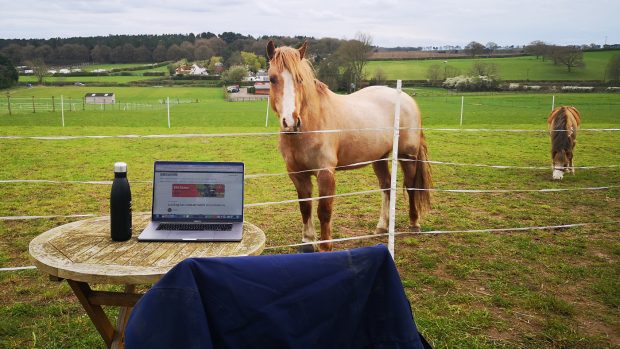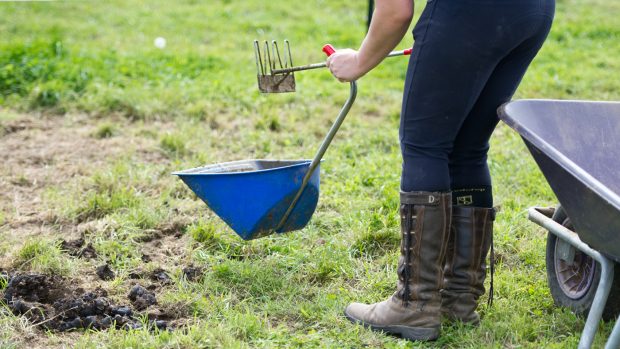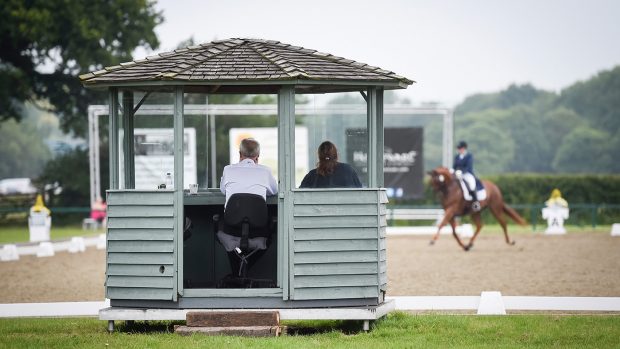No one can resist a smile when they see unusually large (can I use the term giant?) horses. Not only are they comically tall, they’re also a relatively infrequent sight on most livery yards. Horses pushing the 18hh barrier are not only the biggest on a yard by some margin, but if they’re best mates with the yard’s smallest resident, you can’t help but giggle at the comparison.
You’d think giant horses would attract equally tall owners, but this isn’t always the case. That said, even taller riders may feel dwarfed by their oversized equines. Whether you’re on the tall side or are a decidedly short rider, big horses can pose a distinct set of challenges to their owners – and these transcend far beyond an excess of height.
Here are 15 daily struggles faced by owners of giant horses. Do you recognise them – or have we missed some crucial points?
1. Mounting
We’re stating the obvious here, but couldn’t well ignore the glaring issue of horse-rider logistics. Even if you have springs in your feet or athleticism in spades, an oversized mounting block is a must if you don’t want to do yourself/your horse/your saddle a mischief.
Once you do manage to clamber aboard, you might find the arena gate latch somewhat out of your reach. When it comes to tall horses, planning ahead is a must.
2. Dismounting
Sliding off a horse over 17hh feels somewhat akin to abseiling – except there’s no rope attached to prevent freefall. Misjudge the distance, and you could go splat. Alternatively, commit to landing too decisively on a chilly day and you feel that horrible shockwave that travels from your feet to the top of your head as your icy soles strike the ground. Ouch!
3. Sharing kit
You look on with envy as that livery with two perfectly matching thoroughbreds or carbon-copy cobs gleefully mixes and matches rugs, numnahs and bridles whenever the fancy takes them. It’s hard to fit a plus 7ft turnout rug to a child’s 13.2hh, or the ex-racer you bought to keep your giant warmblood company. Sigh. Two full wardrobes it is.
4. Clipping
Most people reserve the steps for clipping their horse’s head. You need them just to reach your horse’s neck and shoulder.
5. Catching
We’ve all had to manage a slightly unwilling equine participant into a headcollar from time to time. This task becomes much more of a challenge when said equine is a part-bred giraffe and his head is practically 10 feet in the air.
6. Cornering
When you’re schooling the equine equivalent of a Viking longship in a 20x40m arena, you become pretty adept at sitting said equine on his hocks. The long side feels like the short side and the short side is basically a pirouette – the corners just don’t stop coming!
7. Stabling
Forget a 12x12ft stable, you need an aircraft hangar for your giant horse. Practically everything needs to be supersized, from the amount of straw in his bed to the capacity of his haynet.
8. Clinics
In a group ride situation, your horse usually towers over everyone else. The session starts with a couple of jokes at your expense (“how’s the weather up there?” etc) but things really fall apart when the coach starts putting out poles or measuring distances. Try as he might, your horse can’t help but rearrange the pole layouts and take a stride out of every combination.
9. Travelling
If you’ve never considered a poll guard before, chances are you’ve never owned a tall horse. Shoutout to anyone who’s bought an equine giant without thinking about the height of their lorry or trailer – it can be a shock the first time you load them up and see their ears touching the ceiling! Time for an upgrade, I’m afraid…
10. Fencing
Giant horses frequently look as if they could simply step over a post-and-rail fence. One has to be careful not to allow the grass to look greener on the other side, just in case they decide to give it a try.
11. Rugging
Firstly, you’ve got the sheer size and weight of the rug itself. Your arms will know if you’re carrying a damp no-fill, but lugging around a soggy 300g is a full-body workout. Not only this, but in order to dress your gargantuan horse in said rug you have to fling its whole weight above your head! It’s a feat not for the faint of heart, nor indeed the weak of arm or back.
12. Leading
A couple of layers to this one. Firstly, big horse often means big stride, so you can find yourself jogging to keep up even if he’s just ambling along.
Secondly, certain manoeuvres take a tad longer with a tall horse, or require a bit more clearance. Whether it’s opening and closing a gate, rounding a corner in the stable block or performing a U-turn, it can take a little longer for the message to get from brain to hooves.
13. Hacking in company
“How are you doing back there?” you yell to the string of smaller horses and ponies trailing several yards behind. You’d offer to slow down, but really you haven’t a lot of choice in the matter.
14. Feeding
Big horses can take some feeding. Every winter you’re staggered by just how much hay you get through on a daily basis, and if they don’t hold their condition well you can be left wondering what to feed your horse to gain weight.
Some tall horses like to couple their higher-than-usual calorie requirements with fussiness, just to give you an extra head-scratcher as you try to ply them with all manner of tempting tastes in their bucket.
15. Cuddles
This is totally anecdotal, unverified advice, but we’re sure there’s a consensus that hugging a horse is the best form of therapy. This can be challenging, however, when a cherry picker is required for you to have a hope of clasping your hands around your favourite giant’s neck.
- To stay up to date with all the breaking news throughout London International and more, subscribe to the Horse & Hound website
You may also be interested in:

14 things your trainer might have said — warning: sense of humour required

6 things that always happened at shows when you were a child

6 things all riders will experience when the clocks go back

Subscribe to Horse & Hound magazine today – and enjoy unlimited website access all year round





